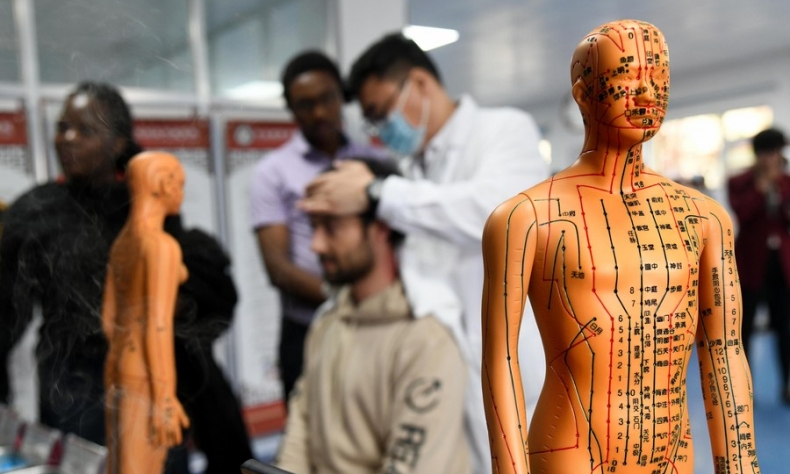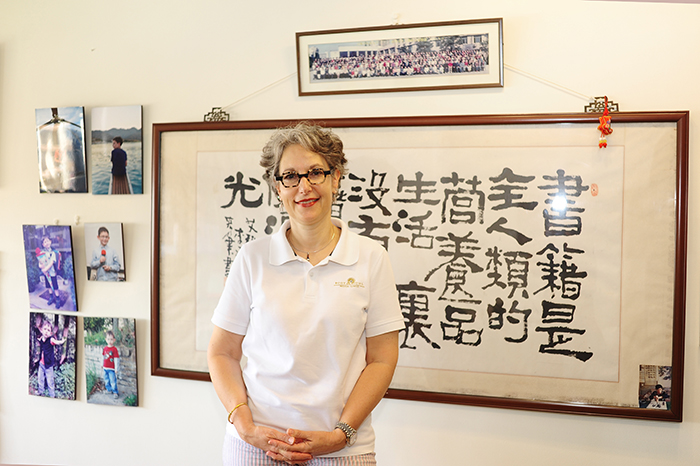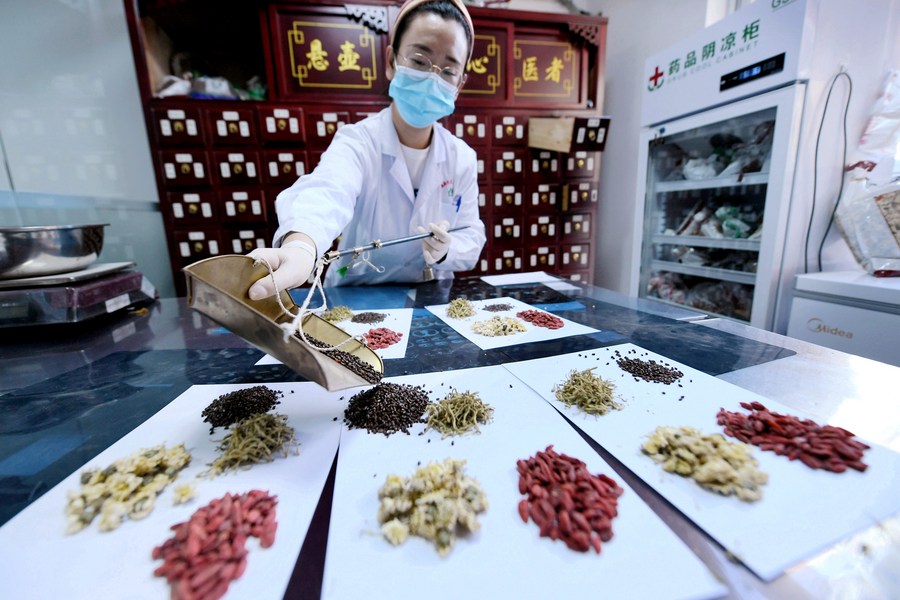Doris Rathgeber: I Can No longer Imagine a Life Without China

All I have is from China. China has helped me overcome my past and find an opportunity to make my dream come true.
She wears a white coat, speaks fluent Chinese, diagnoses patients with the assistance of TCM, and prescribes medication … A German TCM physician working in the Body and Soul clinic in the Huangpu district of Shanghai, Doris Rathgeber, who was born in Düsseldorf in 1966, has been familiar with traditional Chinese medicine for more than twenty years. She has practised mainly in Shanghai for many years and is committed to spreading TCM all over the world.
Staying in China because of TCM
For Doris Rathgeber, her acquaintance with TCM was a “preordained”.
Doris came to Shanghai in 1995 when her husband started a business there, and studied Chinese for two and a half years in order to converse with the locals. One day, a friend told her about TCM, which was the catalyst for her subsequent enrolment in an internal medicine program at Shanghai TCM University.
Looking back, Doris admits that she had encountered quite a few difficulties. She struggled through the linguistic and cultural challenges in the highly intensive medical program. As a foreign student, TCM theories, ancient classical texts and their wording, herbs and herbal formulations posed great challenges for her. “I failed my first exam on herbs with only 40 marks.” After that she burnt the midnight oil every night, raised many questions to her teachers and classmates, and read German books about TCM. Step by step, she managed to catch up with her classmates.
After graduation, Doris founded a clinic with her friends in Shanghai and has been working as a TCM physician ever since. Today, she is fluent in ancient Chinese medical texts such as the “Inner Canon of Huangdi” (Huangdi Neijing) and “Treatise on Febrile Diseases” (Shanghan Lun) and can make her own diagnoses. She is well-versed in Chinese medicinal formulae and acupuncture points that are foreign even to many Chinese.
Doris has been treating a wide range of acute and chronic diseases since 2004 through her proficient combination of traditional Chinese medicine and Western medicine. She also has extensive experience in treating gynecological disorders. Due to great demand, Doris has set up four clinics with competent staff in Shanghai.

Spreading TCM out of love
As a TCM physician with many years of experience, Doris is in a position to comment authoritatively on the differences between TCM and Western medicine. She believes that Western medicine focuses on the disease itself, while TCM is a millennia-old art of healing that regards the human being as an integral whole. Its roots lie in Chinese philosophy. “In Traditional Chinese Medicine, we use philosophical theories that are completely unknown to Western medicine, such as the five-element theory (wood, water, metal, earth and fire), the two ‘opposite poles’ of yin and yang, and qi, or life energy. For chronic diseases and those that are intractable to Western medicine, TCM is a highly effective healing method.”
Traditional Chinese Medicine is a precious treasure and a crystallization of the 5000-year-old Chinese culture. Its preservation and popularization are major concerns for China. Under the direction and active support of the country in recent years, TCM is now experiencing a worldwide boom. In 2019, President Xi Jinping advocated the high-quality development of TCM in conjunction with Western medicine, so that they could complement each other and develop in a coordinated manner. TCM should go global.
As a TCM fan, Doris directs her attention to the development of the field. In 2016, a plan for the development of TCM in other countries between 2016 and 2020 was made part of the Belt and Road Initiative, with the aim of strengthening exchanges and cooperation with neighboring countries in this sector. Doris has kept her fingers crossed and described the TCM initiative as “a right decision”. “I think this is a good way to spread the knowledge of Chinese medicine abroad and allow foreign patients to receive TCM therapies.”
Although TCM itself is accepted in Germany, locals do not know exactly what it includes. Doris finds it this to be a sorry state of affairs. Germans are perhaps most familiar with acupuncture, as well as acupressure and herbal therapy. “However, they don’t understand what’s behind the herbal therapy,” says Doris. In fact, in addition to acupuncture, the TCM treatment also includes medicinal herbs, nutrition, exercise therapy and massages. In her opinion, it is important to explain TCM scientifically and to publicize it, to present knowledge and theories transparently and simply. “To achieve the internationalization of TCM, we must first explain its basics better and more simply. In my opinion, new explanatory models have to be developed.”
In addition to her clinical practice, Doris also gives wide-ranging lectures on TCM, which are aimed at foreigners in Shanghai. This woman from Düsseldorf is wholeheartedly committed to expanding awareness and acceptance of TCM. “I will continue to support and interpret TCM.”

“I can no longer imagine a life without China”
After 26 years in China, Shanghai is now Dori’s second home. When she first came to Shanghai, she found it difficult to cope with the change. The language barrier, the culture shock… Within the first six months she was tempted several times to “flee” Shanghai and return to Germany. But now she likes to refer to herself as a “New Shanghai Woman”.
“All I have is from China. China has helped me overcome my past and find an opportunity to make my dream come true.”
Growing up in Germany, Doris has always wanted to become a doctor. But when her mother died, Doris was just 13 years old, meaning there was “no more room for dreams”. After completing a practical training program, Doris had a successful career in IT sales. But her dream did not come true until she came to Shanghai. Doris has been an eyewitness to the modernization of Shanghai and helped to make it happen. “We are very proud that we were and are part of this development.”
When asked about which changes in Shanghai have impressed her most over the past 20 years or more, Doris has a lot to say. She said that by the end of the last century, restaurants and business in Shanghai were not developed and all shops were closed by 7 p.m. But today, one can find cuisines here from all over the world, as well as every style of Chinese food and restaurants. “This is also part of what makes Shanghai so incredibly attractive!”
Doris has divided her time between China and Germany since 2020. She explains that she will not give up her clinics and the center of her life in Shanghai: “Although my roots are in Germany, Shanghai is also my home, where I have spent half of my life, including nearly all of my adult life. We owe everything we have to Shanghai and it will always be our home. I can no longer imagine a life without China.”
 Facebook
Facebook
 Twitter
Twitter
 Linkedin
Linkedin
 Google +
Google +










